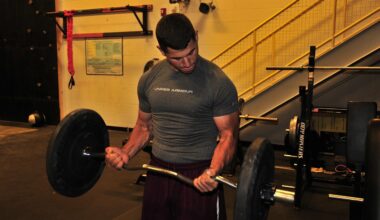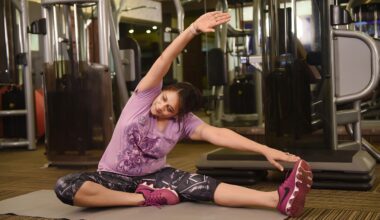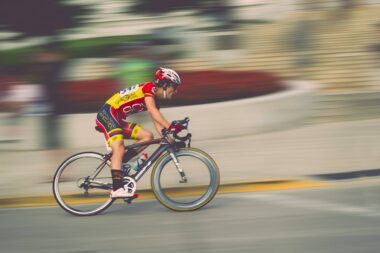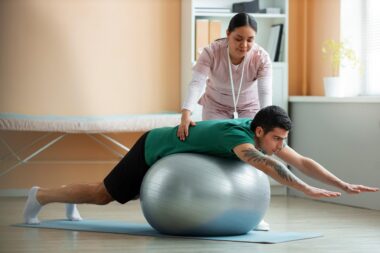Developing Sport-Specific Motor Skills Using Kinesiology
Kinesiology, the scientific study of human movement, plays a crucial role in developing sport-specific motor skills. By understanding the biomechanics involved in various sports, coaches and trainers can tailor their training methods to suit the unique demands of each sport. This customization enhances athletes’ performance by targeting the specific muscle groups, joint actions, and energy systems that are most utilized in their respective sports. Effective kinesiology practice involves assessing an athlete’s current abilities, identifying areas for improvement, and implementing targeted exercises that promote functional movement patterns. Furthermore, incorporating sport-specific drills into training regimens optimizes neuromuscular coordination, ensuring athletes can execute complex skills efficiently. By applying principles of kinesiology, trainers can create individualized programs that cater to athletes’ unique strengths and weaknesses. This scientific approach to training ultimately leads to improved skill acquisition, increased confidence, and better overall performance on the field or court. Coaches equipped with a strong understanding of kinesiology can systematically develop training plans that foster adaptability, injury prevention, and growth. The integration of kinesiology enriches not only sports training but also rehabilitation efforts, effectively blending performance enhancement with safety.
Understanding the fundamentals of kinesiology is critical for sports professionals aiming to develop motor skills effectively. This field encompasses anatomy, biomechanics, physiology, and psychology, offering a comprehensive understanding of body mechanics in various sports. Athletes must develop a strong foundation in basic movement patterns before advancing to sport-specific skills. Kinesiologists assess an athlete’s movement to identify any inefficiencies that may hinder performance or increase injury risk. By analyzing these patterns through video analysis, motion capture technology, and fitness assessments, specialists can develop targeted training protocols. These protocols focus on strength, flexibility, and proprioception necessary for optimal athletic performance. Additionally, integrating strength and conditioning with sport-specific practice ensures that athletes are physically prepared for the demands of their sport. Regular evaluation allows for adjustments to training plans, ensuring continued progress and adaptability. Such assessments include regular strength evaluations, movement quality analysis, and skills testing, which help track performance improvements. Institutions and communities that prioritize kinesiology education see significant advancements in athlete performance, reducing injury rates and enhancing longevity in sports careers. Through dedication and an evidence-based approach, athletes can excel and reach their maximum potential.
The Role of Physical Assessment in Skill Development
Physical assessment serves as a foundational component in developing sport-specific motor skills. By evaluating an athlete’s current physical capabilities, trainers establish baselines that guide their training programs. Key physical assessments often include measuring strength, flexibility, agility, and cardiovascular fitness. Each of these elements is critical in sport-specific contexts since sports demand varying degrees of each quality. For example, a sprinter requires explosive leg strength and agility, whereas a long-distance runner needs optimal cardiovascular endurance. Once assessments are completed, trainers can identify deficiencies and strengths, allowing them to design tailored training programs that focus on enhancing weak areas while maintaining strengths. Furthermore, regular re-assessment provides insight into the effectiveness of training interventions, allowing for both fine-tuning of exercise selection and motivation for the athlete. Coaches and trainers must also educate athletes on the importance of these assessments so that they understand how their training correlates with skill development. By integrating assessment feedback into their practice, athletes can maximize their training results. Utilizing these assessments fosters a culture of continual improvement and pushes athletes to achieve their personal best consistently.
Specificity remains a core principle in kinesiology-focused training regimes, particularly regarding motor skills. The idea of specificity dictates that training should reflect the particular demands of the sport. For instance, a basketball player must develop different movement patterns compared to a soccer player, as each sport emphasizes unique physical skills and movements. Kinesiologists employ this principle by establishing exercises that mimic the dynamics of the sport while enhancing the corresponding physical attributes. Functional movement patterns are incorporated to simulate game-like scenarios, fostering adaptability and skill transferability. Moreover, trainers utilize drills emphasizing speed, agility, and skill execution to enhance timing, precision, and spatial awareness. Sports simulations improve athlete focus and situational responsiveness, critical in competitive environments. This specificity not only optimizes physical capabilities but also reinforces neuromuscular pathways. Consistent practice of sport-specific skills leads to improved automaticity, meaning athletes perform these skills without conscious thought during competition. The importance of specificity cannot be understated, as many athletes often overlook this aspect of training. A detailed understanding of these mechanics leads to significant improvements in an athlete’s performance during competitions, thus enhancing their overall athletic effectiveness.
Enhancing Coordination Through Targeted Training
Coordination is paramount in effectively executing sport-specific motor skills. It refers to the ability to integrate different muscle movements to achieve a desired outcome, such as shooting a basketball or swinging a bat. Effective kinesiology programs incorporate drills designed to enhance coordination through multi-tasking and reaction time. The proprioceptive system, which provides feedback on body position and movement, is developed through various balance and agility exercises. These enhance an athlete’s ability to control their body during dynamic actions, ultimately leading to improved performance. Exercises such as jumping drills, lateral shuffles, and controlled falling enhance muscle response and brain signaling. Additionally, utilizing various tools such as balance boards and agility ladders during training can further enhance coordination and body awareness. Incorporating visual and auditory stimuli during drills also aids in improving reaction times, making training sessions more engaging and beneficial. Coaches can create a fun competitive atmosphere while athletes develop their coordination skills, leading to commercially viable outcomes. Regular coordination training sessions contribute to performance longevity and injury reduction, as effective motor programs promote correct biomechanics and balanced movement patterns.
Another crucial element to developing sport-specific motor skills is understanding the importance of recovery. Recovery plays a vital role in ensuring that athletes can perform at their best while preventing overtraining and injury. Kinesiologists often employ recovery strategies including active recovery, adequate nutrition, hydration, and sleep. These components help the body repair itself from exercise-induced stress to maximize effectiveness and skill retention. Active recovery techniques, such as low-intensity stretching or light aerobic sessions, facilitate lactic acid clearance and promote blood flow. Adequate nutrition, particularly protein intake, supports muscle repair while hydration aids in maintaining optimal physiological function. Conversely, sleep is often undervalued, yet is essential for muscle regeneration and cognitive recovery. Kinesiologists recommend monitoring recovery markers to assess preparedness to train again. Data on heart rate variability, muscle soreness, and subjective feelings of fatigue can help guide these decisions. Properly managing recovery allows athletes to achieve optimal results from their training sessions. Furthermore, fostering a recovery-centered mindset also encourages athletes to prioritize their overall health and well-being, ensuring a sustainable and successful sporting career.
Future Directions in Kinesiology and Sports Skills Development
The future of kinesiology and its application in sports will likely pivot towards integrating technology and personalized data analytics. Current innovations include wearable sensors that track real-time biomechanical data during training sessions. By analyzing this data, coaches can adjust training regimens immediately, allowing for personalized feedback that caters to individual athlete needs. Furthermore, advancements in virtual reality and simulation technology are set to revolutionize how sport-specific skills are honed. Athletes can practice in simulated environments that replicate game conditions, thus enhancing their decision-making abilities. Another exciting direction involves promoting interdisciplinary approaches, where kinesiology intersects with nutrition, psychology, and cognitive training. This holistic perspective ensures that every aspect of an athlete’s performance is nourished, providing insights into the interconnectedness of physical and mental capacities. Educational programs in kinesiology will also evolve, emphasizing practical applications and technological competencies. As the field continues to grow, developing interventions for athletes aiming at enhanced performance while minimizing injury rates will be paramount. Kinesiologists will play an integral role in the future, ensuring that athletes are equipped to meet the challenges of evolving sports landscapes.
Ultimately, the aim of integrating kinesiology into sport-specific motor skill development is to foster well-rounded athletes who can excel in their chosen disciplines. By emphasizing an evidence-based approach, sports professionals can ensure that training practices are effective, efficient, and ultimately culminate in improved performance outcomes. With the focus on biomechanics, physical assessments, specificity, coordination, and recovery, athletes will be prepared to face the demands of competition. Kinesiology serves as a bridge between theoretical knowledge and practical application, shaping how athletes train and compete. In this landscape, the athlete’s perspective is essential, as motivation and mental resilience play critical roles in skill development. Furthermore, as previously mentioned, the integration of technology and personalized practices will ensure that athletes maximize their potential. Continued research in kinesiology will deepen our understanding of motor skills and further enhance training protocols. Consequently, athletes who embrace this approach will be better positioned for success. In conclusion, the advancements in kinesiology and sports science will continue to influence how motor skills are developed. Through a combination of science, dedication, and innovation, athletes can achieve peak performance in their sporting journeys.





